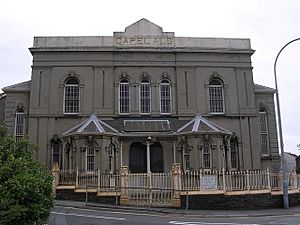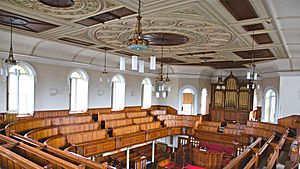Capel Als, Llanelli facts for kids
Quick facts for kids Capel Als, Llanelli |
|
|---|---|
 |
|
| Location | Marble Hall Road, Llanelli |
| Country | Wales, United Kingdom |
| Denomination | Independent (Congregationalist) |
| History | |
| Founded | 1780 |
| Architecture | |
| Heritage designation | Grade II |
| Designated | 3 December 1992 |
| Architect(s) | Thomas Thomas |
| Architectural type | Chapel |
| Style | Late 19th century |
Capel Als is a very important chapel in Llanelli, Wales. It belongs to the Independent (Congregational) church. Many people think it is one of the most significant religious buildings in all of Wales.
There are a couple of ideas about how the chapel got its name. One story says it was named after a woman called Als. Her cottage supposedly stood where the chapel was built. Als is a Welsh name, like Alice in English. Another idea was that "als" meant "rock" in Welsh. However, this is not true, so we can ignore that idea.
Capel Als is a Grade II-listed building. This means it is a special building that needs to be protected. Many people believe it should have an even higher status because of its history.
Contents
The Chapel's Beginnings
The very first building at Capel Als was built in 1780. People described it as "very simple and basic." It was made bigger in 1797. At that time, Llanelli was growing fast. Industries like coal, iron, and copper were expanding.
Capel Als was originally connected to a church in Llanedi. Evan Davies was the minister at Llanedi starting in 1775. He helped create new churches in places like Cross Inn (now Ammanford), Kidwelly, and Pembrey, as well as Llanelli.
David Rees: A Leader for Change (1829-1869)
The first minister we know about at Capel Als was David Rees. He was a famous preacher and also published a newspaper. David Rees came to Llanelli in 1829. At that time, the chapel had about 250 members.
By 1832, the number of members had grown to 446. Rees then started to replace the old 1797 building with a much larger one. During the first half of his time as minister, Rees helped start several new chapels. These included Park Church (1839), Siloah (1841), and Capel-y-Bryn (1841). Even with many members moving to these new churches, Capel Als still had 580 members in 1850.
The chapel was rebuilt and made even bigger in 1852. This work was overseen by Thomas Thomas, an architect from Swansea. Thomas later used a similar design for other chapels.
David Rees was also known for publishing a newspaper called Y Diwygiwr, which means "The Reformer." He also helped provide education for people. When he passed away in 1869, Capel Als had over 800 members.
Thomas Johns: Continuing the Legacy (1869-1914)
After David Rees, Thomas Johns became the minister in 1869. He stayed until 1914. Thomas Johns was a very important person in the Welsh nonconformist movement.
He was asked to become the pastor of Capel Als in 1869 and accepted. He remained there for the rest of his life. Early in his time, a new schoolroom was built. In 1875, some members left to form a new church called Tabernacle. Capel Als even gave a lot of money to help build this new church.
Hundreds of members moved from Capel Als to the new Tabernacle church. People hoped this would help with the overcrowding at Capel Als. The chapel often felt stuffy and uncomfortable, especially when it was full for Sunday evening services.
The best solution was to build a new chapel. Some members wanted to knock down the old building. However, older members strongly disagreed. So, they found a middle ground. The new building kept many parts of the David Rees chapel but was made much larger. The work was finished in 1894 by Owen Morris Roberts.
More Recent History
D.J. Davies became the minister at Capel Als in 1916. He served for 42 years until he retired in 1958. During his time, the number of members reached its highest point, with 1,007 people in 1935.
Iorwerth Jones took over after D.J. Davies. He wrote a book about David Rees during his time as minister. Maurice Loader was the minister from 1975 until 1994.
 | Aaron Henry |
 | T. R. M. Howard |
 | Jesse Jackson |


